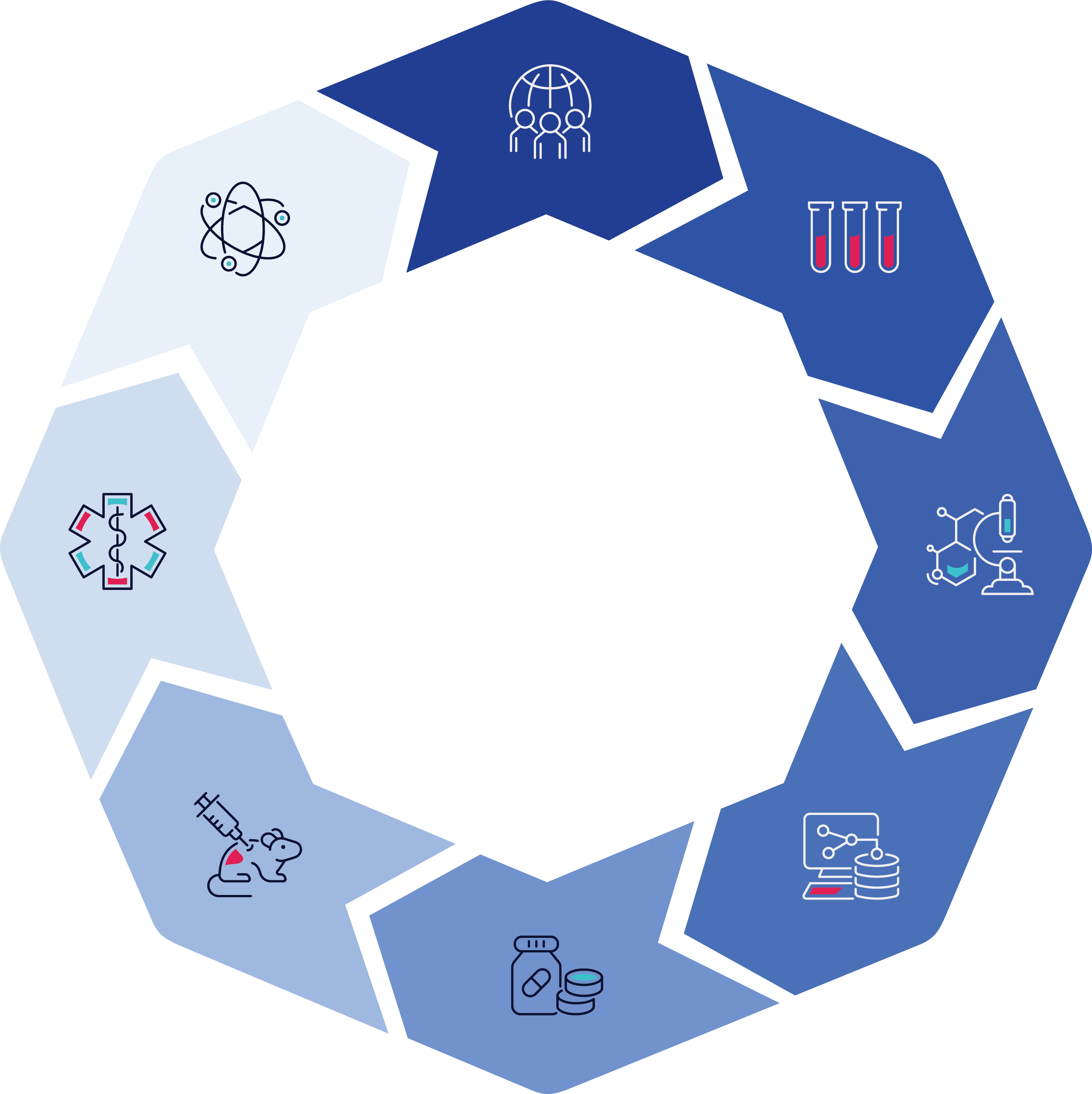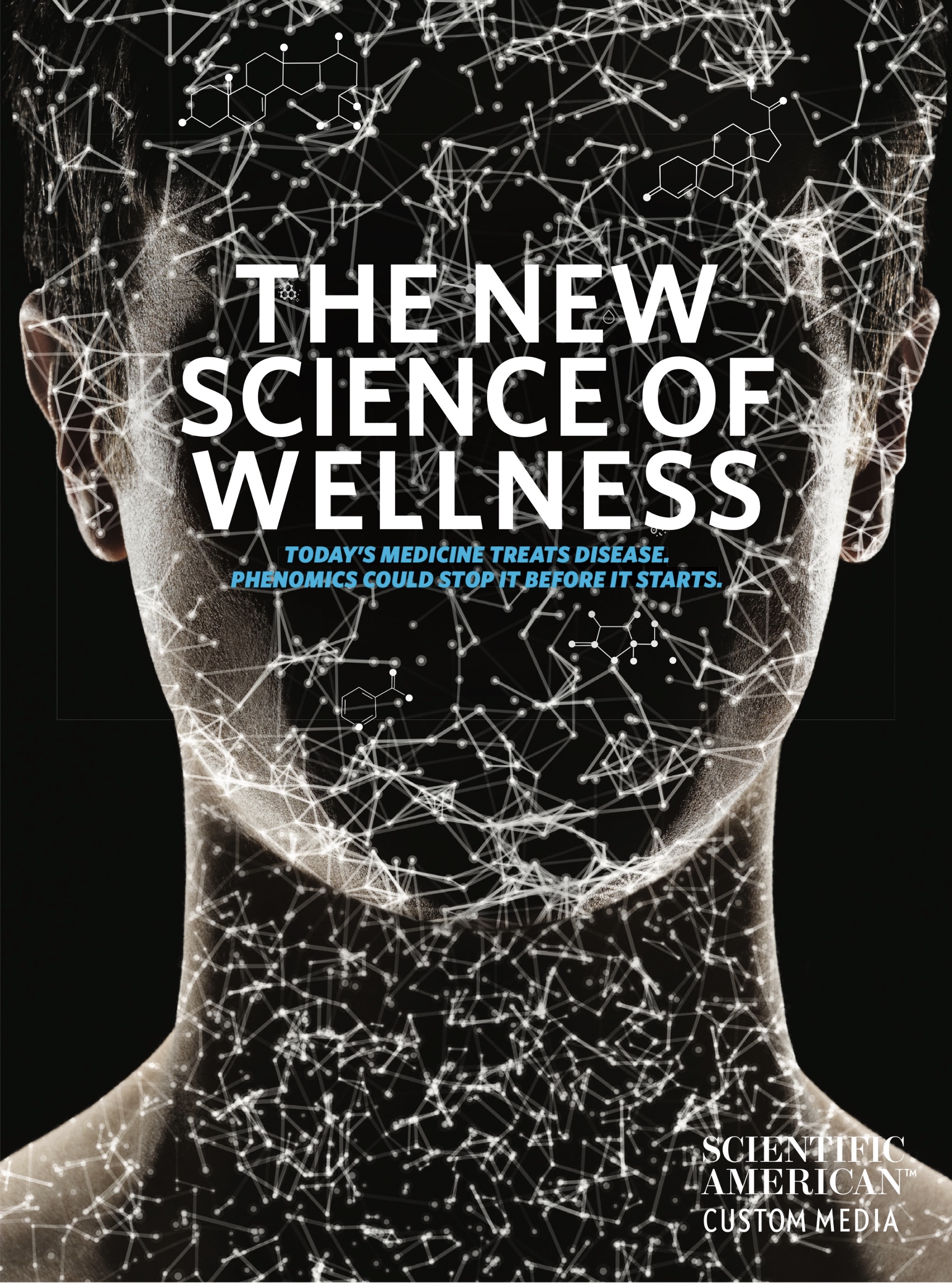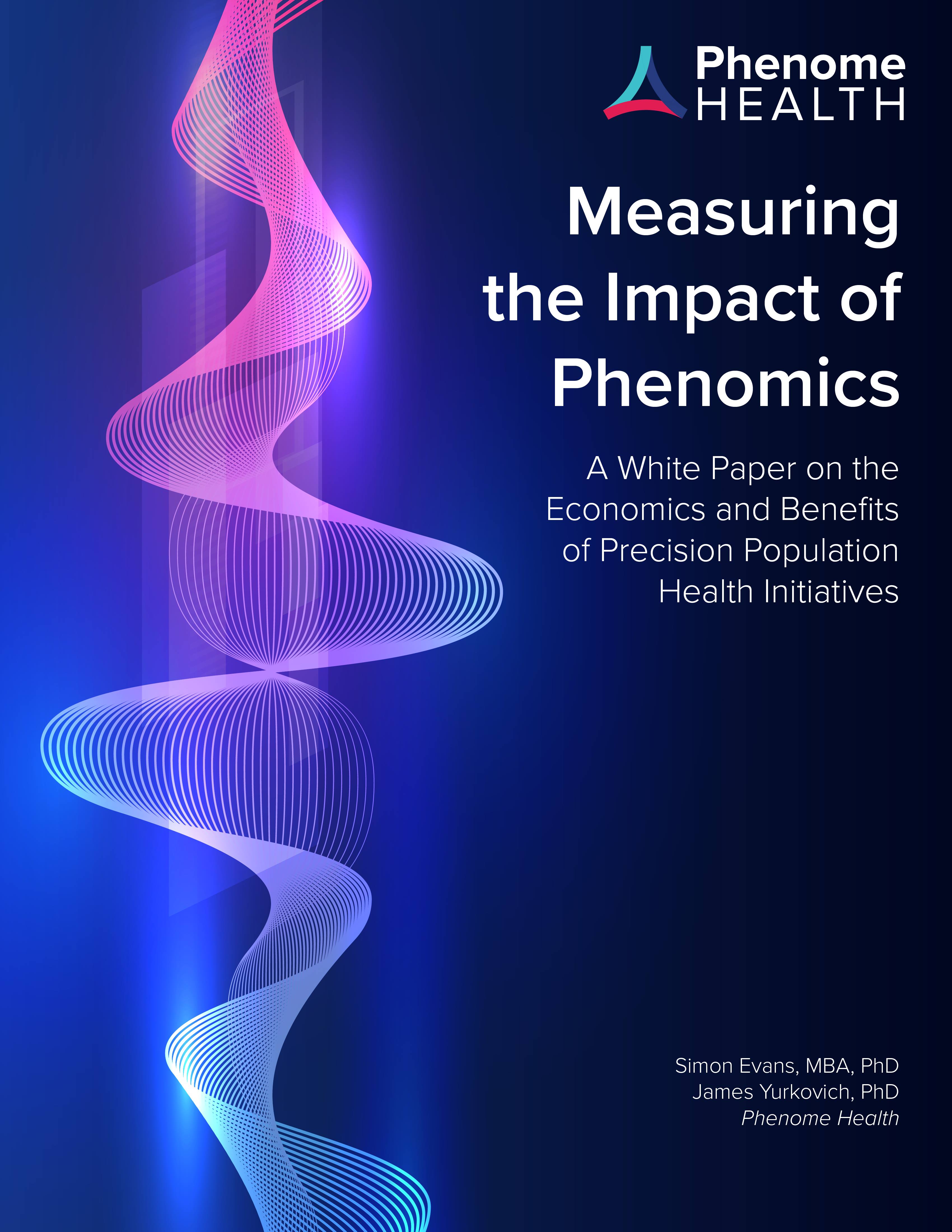CENTER FOR PHENOMIC HEALTH
The partnership between the Buck Institute and Phenome Health resulted in the launch of the new interdisciplinary Center for Phenomic Health (CfPH). The Center’s primary goal is to translate innovative new science of aging—from new drug compounds and preclinical models to computational technologies and algorithms—to clinical practice. This goal will be accomplished through a detailed profiling of the human phenome, the collection of dynamic and observable characteristics of an organism, ranging from the amount of markers in blood (like cholesterol) to physiological signals (such as heart rate). This comprehensive profiling ranges from molecular assays and clinical data to social determinants of health and digital measures of environmental exposures and behaviors to provide a deep, holistic understanding of an individual.
INSPIRING INNOVATION THROUGH BIOTECHNOLOGY DEVELOPMENT
The Center’s innovation engine powers the translation of biomedical discovery from predictive modeling and bench research to the clinic. This highly interdisciplinary process involves several faculty and labs at the Buck Institute.
 |
EDUCATE & RECRUIT Promoting the value of longitudinal phenomics to broad audiences, from clinicians and scientists to patients and consumers of the healthcare system, and building observational trials involving diverse cohorts.
|
 |
SAMPLE & DATA COLLECTION Integrating multiple sample and data streams to build a massive repository of biospecimens that will fuel biomedical research and discovery of both wellness and disease.
|
 |
DATA GENERATION Leveraging core facilities at the Buck Institute and partners to support the generation of high-dimensional phenomic data on biobanked samples.
|
 |
INTEGRATIVE ANALYSIS Implementing computational pipelines for data processing, quality control, and analysis that apply cutting-edge AI and integrative, predictive modeling to power mechanistic discovery and biomarker identification.
|
 |
THERAPEUTIC DESIGN Identifying intervention strategies leveraging the mechanistic pipelines and expertise at the Buck Institute for causal explanations of observed trends from computational analyses.
|
 |
PRECLINICAL VALIDATION Testing novel intervention strategies by leveraging model systems to build on and extend the mechanistic work done by labs across the Buck Institute.
|
 |
CLINICAL TRIALS Conducting human clinical trials for intervention strategies validated by preclinical models to explore the translation of innovative new technologies to clinical practice.
|
 |
IMPLEMENTATION Delivering value to society through commercialization and clinical implementation of novel approaches.
|

Programs at the Center pass through this cycle, undergoing iterative refinement of new technologies. The optimized form of these technologies are translated into preclinical models and eventually human studies.
The goal of the Center is to eventually realize the adoption of these new technologies to help people live better longer.
SUPPORTED BY THE COMPUTATIONAL RESOURCES AT PHENOME HEALTH
The Center is fully integrated with Phenome Health’s cloud-based data infrastructure to support the storage and analysis of all genomic and phenomic data. This infrastructure, the Phenome Core, offers state-of-the-art cybersecurity and analytic tools specifically designed to meet the unique requirements of storing and analyzing biological data.
The partnership between the Buck Institute and Phenome Health resulted in the launch of the new interdisciplinary Center for Phenomic Health. The Center’s primary goal is to translate innovative new science—from new drug compounds and preclinical models to computational technologies and algorithms—to clinical practice. It will pioneer the application of phenomics to human health, aging, and disease.
Lee Hood, MD, PhD
Director, Center for Phenomic Health
Distinguished Professor, Buck Institute
Founder and CEO, Phenome Health
CENTER DETAILS
-
 Lee Hood, MD, PhD Co-Director, Center for Phenomic Health
Lee Hood, MD, PhD Co-Director, Center for Phenomic Health
Chief Innovation Officer and Distinguished Professor, Buck Institute
Founder and CEO, Phenome HealthA world-renowned scientist and recipient of the National Medal of Science in 2011, Dr. Leroy Hood co-founded the Institute for Systems Biology (ISB) in 2000 and served as its first President from 2000-2017. In 2016, ISB affiliated with Providence St. Joseph Health (PSJH) and Dr. Hood became PSJH’s Senior Vice President and Chief Science Officer. He is also Chief Strategy Officer and Professor at ISB.
Dr. Hood is a member of the National Academy of Sciences, the National Academy of Engineering, and the National Academy of Medicine. Of the more than 6,000 scientists worldwide who belong to one or more of these academies, Dr. Hood is one of only 20 people elected to all three.
He received his MD from Johns Hopkins University School of Medicine and his PhD in biochemistry from Caltech. Dr. Hood was a faculty member at Caltech from 1967-1992, serving for 10 years as the Chair of Biology. During this period, he and his colleagues developed four sequencer and synthesizer instruments that paved the way for the Human Genome Project’s successful mapping and understanding of the human genome. He and his students also deciphered many of the complex mechanisms of antibody diversification. In 1992, Dr. Hood founded and chaired the Department of Molecular Biotechnology at the University of Washington, the first academic department devoted to cross-disciplinary biology.
Dr. Hood has co-founded 17 biotech companies including Amgen, Applied Biosystems, Rosetta and Arivale. His many national and international awards include the Lasker Prize, the Kyoto Prize, and the National Medal of Science. Currently, he is the Founder and CEO of Phenome Health and Chief Innovation Officer and Distinguished Professor at the Buck Institute for Research on Aging. He is also the Co-Founder and Professor at the Institute of Systems Biology in Seattle.
-
 Eric Verdin, MD Co-Director, Center for Phenomic Health
Eric Verdin, MD Co-Director, Center for Phenomic Health
President and Chief Executive Officer, Buck InstituteDr. Eric Verdin is the president and chief executive officer of the Buck Institute. A native of Belgium, Dr. Verdin received his Doctorate of Medicine from the University of Liege and completed additional clinical and research training at Harvard Medical School. He has held faculty positions at the University of Brussels, the National Institutes of Health, the Picower Institute for Medical Research, and the Gladstone Institutes. Dr. Verdin is also currently a professor of medicine at University of California, San Francisco.
In 2016, Dr. Verdin established his lab at the Buck to study the relationship between aging and the immune system. He is an elected member of several scientific organizations including the American Association for the Advancement of Science, the American Society for Clinical Investigation, and the Association of American Physicians. He has published more than 270 scientific papers and holds 18 patents.
-
 Jeffrey Boore, PhD Chief Technology Officer, Phenome Health
Jeffrey Boore, PhD Chief Technology Officer, Phenome HealthFor the last five years, Dr. Boore has been the Director of Translational Medicine for Providence St. Joseph Health and a visiting scientist at the Institute for Systems Biology, in each case working directly for Leroy Hood, MD, PhD, the primary architect of this vision for transforming healthcare. Prior to this, he was a professor at the University of California Berkeley for 17 years, a scientist at Berkeley National Laboratory, the Head of Comparative Genomics at the DOE Joint Genome Institute (JGI), one of the world’s largest genome sequencing centers, and the founder and CEO of Genome Project Solutions, Inc., a corporation devoted to genomics and bioinformatics. Through these experiences, he has authored 125 scientific manuscripts that have been collectively cited in the scientific literature more than 32,000 times, served on review and advisory panels to NIH, NSF, and USDA, led 23 grant-funded projects, trained scores of postdocs, graduate students, and visiting researchers, and served on the six-member Senior Management Committee of the JGI to manage an annual budget of over $65 million. He created the DOE “Community Sequencing Program,” a $20 million per year project, effectively converting JGI into the world’s premier center for comparative genomics. Prior to all of this, and overlapping somewhat with years as a graduate student, postdoc, and junior faculty, he spent 20 years as an officer in the Air Force and (part-time) Air National Guard, retiring as a Lieutenant Colonel. He was educated at the Pennsylvania State University (B.S.) and the University of Michigan (M.S. and Ph.D.), all in biology with an emphasis on genomics, bioinformatics, and molecular biology.
-
 Simon Evans, MBA, PhD Chief Operating Officer, Phenome Health
Simon Evans, MBA, PhD Chief Operating Officer, Phenome HealthAfter receiving his B.S. from Western Washington University, Dr. Evans spent five years in the Seattle Biotech industry before returning to graduate school for a doctorate at Oregon State University, with formal training in molecular and cellular biology applied to neurochemistry. His postdoctoral work at the University of Michigan focused on the neurochemistry of stress disorders and yielded a series of publications, including the first implication of the central fibroblast growth factor system in major depressive disorder. Dr. Evans stayed on as faculty at Michigan for another 15 years and during this tenure, retrained in Public Health, Nutrition Science and Human Clinical Research through an NIH Career Development Award. This precipitated a transition to direct a research program focused on understanding the role of dietary patterns in the burden of disease of psychiatric disorders, leveraging multiomics approaches and another series of publications that included the first analysis of the gut microbiome in Bipolar Disorder. After leaving Michigan, Dr. Evans joined Drs. Lee Hood and Nathan Price at the Institute for Systems Biology in Seattle with another shift into research administration. More recently, he received his MBA from the University of Illinois and joined Phenome Health as the Chief Operating Officer. Here, Dr. Evans is integrating business frameworks with his research experience to help drive the implementation of the Human Phenome Initiative.
-
 Lee Hood, MD, PhD Chief Executive Officer, Phenome Health
Lee Hood, MD, PhD Chief Executive Officer, Phenome HealthA world-renowned scientist and recipient of the National Medal of Science in 2011, Dr. Leroy Hood co-founded the Institute for Systems Biology (ISB) in 2000 and served as its first President from 2000-2017. In 2016, ISB affiliated with Providence St. Joseph Health (PSJH) and Dr. Hood became PSJH’s Senior Vice President and Chief Science Officer. He is also Chief Strategy Officer and Professor at ISB.
Dr. Hood is a member of the National Academy of Sciences, the National Academy of Engineering, and the National Academy of Medicine. Of the more than 6,000 scientists worldwide who belong to one or more of these academies, Dr. Hood is one of only 20 people elected to all three.
He received his MD from Johns Hopkins University School of Medicine and his PhD in biochemistry from Caltech. Dr. Hood was a faculty member at Caltech from 1967-1992, serving for 10 years as the Chair of Biology. During this period, he and his colleagues developed four sequencer and synthesizer instruments that paved the way for the Human Genome Project’s successful mapping and understanding of the human genome. He and his students also deciphered many of the complex mechanisms of antibody diversification. In 1992, Dr. Hood founded and chaired the Department of Molecular Biotechnology at the University of Washington, the first academic department devoted to cross-disciplinary biology.
Dr. Hood has co-founded 17 biotech companies including Amgen, Applied Biosystems, Rosetta and Arivale. His many national and international awards include the Lasker Prize, the Kyoto Prize, and the National Medal of Science. Currently, he is the Founder and CEO of Phenome Health and Chief Innovation Officer and Distinguished Professor at the Buck Institute for Research on Aging. He is also the Co-Founder and Professor at the Institute of Systems Biology in Seattle.
-
 Jennifer Lovejoy, PhD Translational and Behavioral Scientist Consultant, Phenome Health
Jennifer Lovejoy, PhD Translational and Behavioral Scientist Consultant, Phenome HealthDr. Lovejoy is a translational and behavioral scientist with deep experience in personalized medicine and behavior change. She holds a B.S. degree from Duke University in Zoology, M.S. and Ph.D. degrees from Emory University in Physiological Psychology, and she completed postdoctoral training in Endocrinology and Metabolism at Emory University School of Medicine. During her academic career, Dr. Lovejoy held the Manship Endowed Professorship in Diabetes at the Pennington Biomedical Research Center, Louisiana State University. She is a Past-President of the Obesity Society and has published over 90 peer-reviewed papers on her research. She currently holds affiliate faculty appointments at the Institute for Systems Biology and Washington State University’s Elson S Floyd College of Medicine.
More recently, Dr. Lovejoy has held senior executive roles in several health and wellness companies. She was Chief Translational Science Officer at Arivale, the scientific wellness startup uniting systems biology and behavioral science to help consumers optimize wellness, where she developed the behavioral coaching program, oversaw selection of genomic and other biomarkers returned to consumers, and helped guide the focus of the multi-omic research program. She was also Head of Science at Seven, a digital health startup developing a unique behavioral AI platform to improve lifespan and healthspan, as well as the VP of Innovation and Program Strategy at the Lifestyle Medicine Institute. Currently, she provides consulting services via her company, integralscience.net.
-
 Eric Verdin, MD President and Chief Executive Officer, Buck Institute
Eric Verdin, MD President and Chief Executive Officer, Buck InstituteDr. Eric Verdin is the president and chief executive officer of the Buck Institute. A native of Belgium, Dr. Verdin received his Doctorate of Medicine from the University of Liege and completed additional clinical and research training at Harvard Medical School. He has held faculty positions at the University of Brussels, the National Institutes of Health, the Picower Institute for Medical Research, and the Gladstone Institutes. Dr. Verdin is also currently a professor of medicine at University of California, San Francisco.
In 2016, Dr. Verdin established his lab at the Buck to study the relationship between aging and the immune system. He is an elected member of several scientific organizations including the American Association for the Advancement of Science, the American Society for Clinical Investigation, and the Association of American Physicians. He has published more than 270 scientific papers and holds 18 patents.
-
 James T Yurkovich, PhD Research Assistant Professor
James T Yurkovich, PhD Research Assistant Professor
Chief Innovation Officer, Phenome HealthJames holds a BS in Electrical Engineering from the University of Notre Dame and a PhD in Bioinformatics and Systems Biology from the University of California San Diego. From there, he completed a Faculty Fellowship at the Institute for Systems Biology in Seattle. He then transitioned into the biotech industry by joining the pharmaceutical company Biosplice Therapeutics (formerly Samumed) to build and lead a systems biology division focused on understanding the healthy functioning and aging of the human musculoskeletal system. At Phenome Health, James spearheads new opportunities—technologies, computational methods, and collaborations—that bridge the gap between the scientific and technological efforts. He helps lead the architecture and implementation of the Phenome Core cloud infrastructure and technology platform that supports the scientific discovery and return of results. He also leads efforts in machine learning (ML) and artificial intelligence (AI), bridging the gap between computer science and biology. His interdisciplinary background spans mechanistic modeling, machine learning, network analysis, and dynamical systems theory. James is an Adjunct Professor in the Department of Bioengineering at the University of Texas at Dallas, where he also serves on the Industrial Advisory Committee.
 Scientific American: The New Science of Wellness
Scientific American: The New Science of Wellness
Science is poised to shift the focus of healthcare from a disease focus to a wellness focus-the prediction and prevention of disease. Making the ‘Science of Wellness’ a reality will require a radical change in how we think about healthcare. In this Scientific American special issue, join Phenome Health founder Lee Hood and others to learn about the new era of biomedicine, from the tools like genome sequencing to new computational technologies, and a future of health where health is predictive, preventive, personalized, and participatory.
As we reach the quarter point of the 21st Century, breakthroughs in science and technology are enabling the diagnosis of thousands of diseases from vials of blood However, our healthcare systems are slow to integrate these advancements that have the potential to revolutionize the way medicine is practiced. Here, we explore the potential economic impact and clinical benefits of integrating new genomic and phenomic technologies into standard clinical practice
Selected Publications
- James T. Yurkovich, Simon J. Evans, Noa Rappaport, Jeffrey L. Boore, Jennifer C. Lovejoy, Nathan D. Price & Leroy E. Hood, The transition from genomics to phenomics in personalized population health, Nature Reviews Genetics, 13 December 2023







